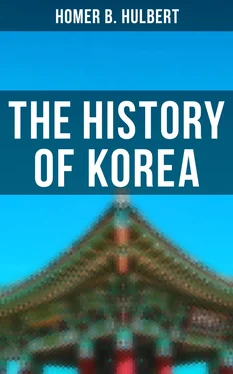The rebel forces were scattered but reunited in various places and terrorized the whole north, so that envoys to the Kin court had to go a round-about way to avoid them. The whole country in fact was in a state of anarchy. In the south whole sections of the country were disaffected toward the government and bands of men roamed the country. There was a rising also in Whang-hă Province. In P‘yŭng-yang the people rose and drove out the governor. The king was forced to begin the correction of abuses. He sent all about gathering information as to how the people were governed and as a consequence eight hundred officials were cashiered. But the attempt at renovation came too late. In the west the bands of robbers looted right and left and could not be apprehended. The capital itself swarmed with thieves. The ancestral temple itself was robbed of its utensils. But all this time the king kept up a round of carousals and debaucheries at which he himself played the buffoon, and danced for the delectation of his guests, and that too at a monastery. A sacred place truly!
In the twelfth year of the reign, 1182, we find an interesting application of what goes in these days under the name of “faith cure.” A priest claimed to be able to cure any disease. Being called before the king he said, “If anyone drinks water in which I have washed my hands he will be immediately cured.” He further explained “After drinking the water, pray earnestly to Buddha. Then rise and say ‘I am cured’, and if you really believe you are cured, you will be so.” Crowds of people applied to him for treatment. He seduced many of the women who came to him.
Gen. Yi Eui-mun was now court favorite and he usurped all the leading offices and acted as pander-in-general to the King by seeking out and forcibly carrying to the palace young and handsome girls. This seemed intolerable to such loyal men as Gen. Ch‘oe Chung-heun, and he, in company with his brother, surrounded the palace, killed Yi Eui-mun and many others of his ilk, chased away many illegitimate sons of the king, who had become monks, and would not let them enter the palace again. This all happened in 1196, and two years later the reformer continued the good work by deposing the old and indolent king, banishing the crown prince to Kang-wha and putting the king’s brother Mun on the throne. His posthumous title is Sin-jong. The banishing of the crown prince and his wife was effected in a very heartless manner. They were ordered out of the palace at a moment’s notice and, coming forth entirely unprepared for the journey, were mounted on horses in a cold rain and hurried away to Kang-wha. A terrible storm raged the day the King was deposed, as if in sympathy with the throes throughthe country was passing.
There was a saying current among the people which shows at once how superstitiousthey were and to what an extent the eunuchs were wont to abuse their power. They said “If the King uses water from the Ta-nă Wall many eunuchs will arise and will cause the government to be administered badly;” so the well was filled up. Another instance shows what a terrible temptation there was for the people to abuse their power. This same reformer Ch’oeChung-heun, though himself a man of perfect uprightness, had a brother who now took advantage of his position to force the king to take his daughter as queen. To do this the real queen had to be banished. As it happened, the king was deeply attached to her, but he was in no position to refuse to do the bidding of the powerful courtier. After a tearful parting she went into exile. This was as yet unknown to the reformer, but when he learned of it his indignation was deep and fierce. Cloaking his feelings, he called his brother to a feast and there reminded him that they were not of a high enough family to furnish a queen, and he charged him to give up the attempt. The next day, the villain changed his mind again. His mother expostulated with him and he felled her to the floor. Gen. Ch‘oe was told of this and, surrounding himself with a strong body-guard, he proceeded to the palace gate. When his niece was brought in her chair and was about to enter to become queen, the faithful old general disputed the passage and a fight ensued between his men and his brother’s. The former were successful and the wretch betook himself to flight, but was pursued, taken and killed by the general himself. The rightful queen was restored to her station.
Конец ознакомительного фрагмента.
Текст предоставлен ООО «ЛитРес».
Прочитайте эту книгу целиком, купив полную легальную версию на ЛитРес.
Безопасно оплатить книгу можно банковской картой Visa, MasterCard, Maestro, со счета мобильного телефона, с платежного терминала, в салоне МТС или Связной, через PayPal, WebMoney, Яндекс.Деньги, QIWI Кошелек, бонусными картами или другим удобным Вам способом.
The following details of the Ki-ja dynasty are taken from a work recently compiled in P’yung-yang and claiming to be based on private family records of the descendants of Ki-ja. It is difficult to say whether any reliance can be placed upon it but as it is the only source of information obtainable it seems best to give it. The dates are of course all B.C.









